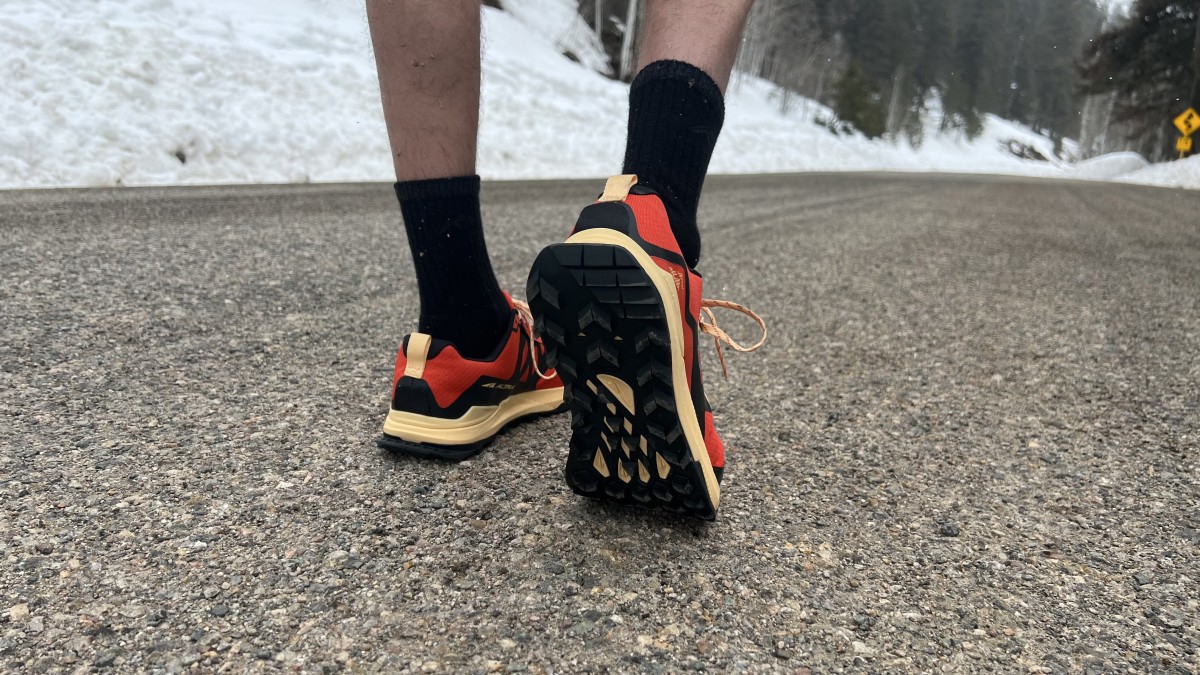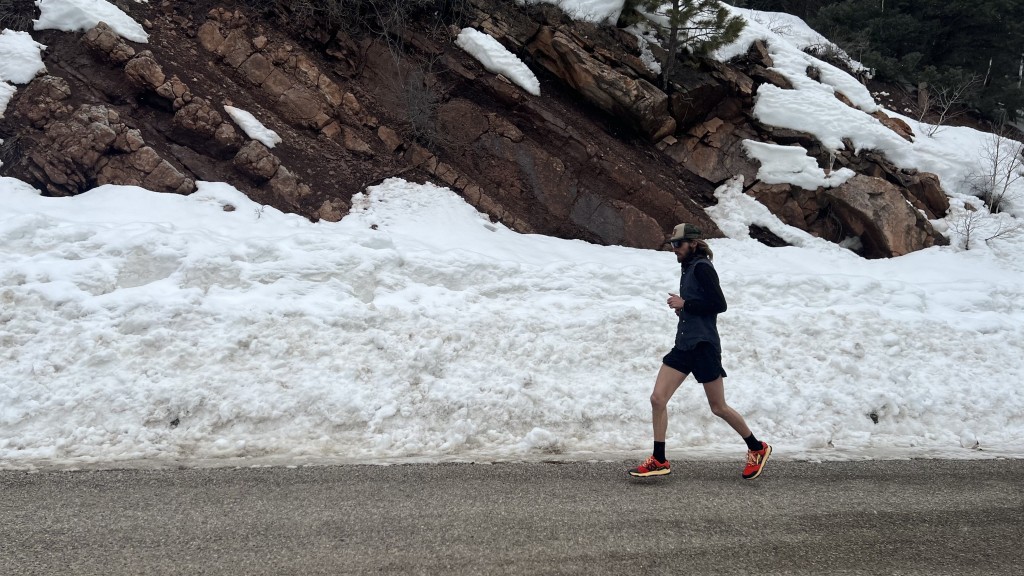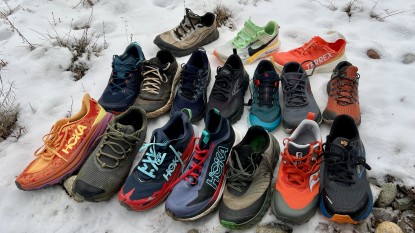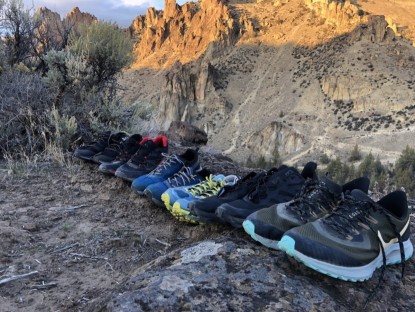Our Verdict
Our Analysis and Test Results
Odds are you are reading this review because you are interested in a zero-drop shoe. For pure running, we prefer models with some drop (4-8mm), but we still feel the Lone Peak 7 has something to offer. The longer you are out, the more appealing this shoe becomes. If you are planning a thru-hike or extended trip where you want the agility of a running shoe with long-term unrestricted comfort, then this could be the model for you. The forefoot is not snug enough for us to want to rip technical trails in, but the overall comfort is top-notch for multi-day outings.
Foot Protection
With a zero drop and a more minimal stack height (25mm), you can expect to feel more of the trail in the Lone Peak 7 than some of the stiffer models we tested. Moderate cushioning keeps you less fatigued but still allows for a great ground feel. However, due to this blend of sensitivity and cushioning, there is slightly less foot protection from rocks, roots, and other trail debris.
The toe cap coverage is substantial but is also more flexible and provides less impact resistance than other models we tested. This keeps the front end of the shoe feeling less rigid and benefits overall comfort. We are fans of the thick, durable upper material, which is great for sand and scree due to the less porous fabric. The optional trail gaiter attachment point also allows for added protection which is not found on any of the other brands we tested.
Traction
The unidirectional tread pattern leaves a bit to be desired when running on technical terrain. The Trail Claw design is great for running uphill and propelling forward, but it lacks any hard edges to help with cornering or descending fast. This wouldn't be a shoe we'd pick for race day, but it's a great all-around tread pattern for general mountain/trail usage.
With a zero-drop shoe, more of your weight is transitioned to your heel with each foot strike. This can be beneficial to traction if your muscles are conditioned to handle the extra fatigue, but it can cause issues if you do too much too soon. When descending, there will be little extra support, and your legs will take slightly more load than a shoe that helps lift your heel to reduce fatigue. The wide roomier fit of the Lone Peak 7 gave us less confidence when navigating steep technical terrain due to the looser forefoot. However, we found the rubber to be softer than some of the other models we tested, which allowed it to work well in a variety of dry and wet conditions. Due to the smaller lugs and flatter profile, this shoe does not work well in snow and mud.
Sensitivity
The stack height on the Lone Peak is consistent across the entire shoe (this is what makes it a zero/0mm drop), allowing for great sensitivity on all kinds of surfaces and trail types. Moderate cushioning takes a bit of that sensitivity away, but during our testing, we enjoyed the natural feel that kept us connected to the trail. While not as sensitive as the Altra Superior 6, the Lone Peak 7 impressed us with its blend of cushioning that still allowed us to navigate uneven terrain and adjust our stride when running technical downhills.
The wide platform of the Lone Peak allows the foot to splay naturally, and the minimal arch support does not alter your natural foot position when impacting the ground. Some users not used to the wide zero drop design could find this sensitivity fatiguing over time, but with moderate usage and training, we found this to be a standout feature of this shoe, and it scored highly when compared to others in this test category.
Stability
Most traditional shoes have adjusted heel to toe-drop to compensate and/or help reduce fatigue, mainly on the Achilles and lower calves. The 0mm drop on the Lone Peak helps keep and maintain a natural position when in motion. The wider platform and minimal arch support further enhance stability and natural foot movement. Since weight is evenly distributed across the foot, your muscles do the stability work for you, maintaining proper form and alignment.
As part of our testing protocol, we ramp up our runs once our legs get used to the lack of assistance found on a zero-drop shoe. We found the unique combination of comfort, stability, and natural splay with the Lone Peak 7 to greatly enhance the feeling of stability, and our legs got noticeably stronger too. However, on extended runs and days with lots of vert and descent, our feet and muscles were noticeably more fatigued than with more “traditional” shoes. Likely this is due to our less conditioned form — if you always run in zero-drop shoes, you likely are used to this added fatigue.
Comfort and Fit
As discussed, the wide platform and ample room in the toe box of the Lone Peak 7 make it an excellent fit for both running and hiking. While not as snug in the forefoot as we like for hard running, it's clear why people choose this shoe to hike thousands of miles. The upper is comfortable, but some may find the thicker fabric less ideal. This is great for preventing small trail debris like sand and scree from finding its way into your sock. Adding a gaiter using the attachment point allows for even more protection.
This thicker material, however, is less breathable and maintains more moisture than years past, something daily users, especially while on the trail, may come to dislike. We also found the wider platform increased the forefoot creasing, and when we went to try and tighten it down, the crease got worse. Luckily, this stiffer fabric softens over time, lessening the effect. While overall daily comfort is hard to beat, some may find the comfort when running hard or at your limit a bit vaguer, especially on the most technical terrain.
Weight
With a minimal design, we were surprised by the increase in weight of this iteration — 11.33 ounces per shoe for a US size 10.5. This added weight over the previous model likely comes from an increase in traction and more durable fabrics found in the upper. While this shoe still feels lively given its sensitivity and comfort, we think that a shoe of this nature should weigh less. The traction also didn't blow us away. This transition to heavier materials makes it seem that Altra is mostly focused on the hiking community, which, in our opinion, makes sense given the need for long-term durability.
Should You Buy the Altra Lone Peak 7?
If you are familiar with zero-drop shoes and are interested in long days switching between running and hiking, then this definitely could be the shoe for you. If you often find yourself hard charging on technical terrain, then you may want a shoe that provides a bit more drop to reduce pounding fatigue.
What Other Running Shoes Should You Consider?
If you are deterred by the increased weight of the Lone Peak 7, you may consider the Altra Superior 6, which is lighter and has greater sensitivity. Either shoe from Altra is bound to get you closer to the ground while providing great comfort. For those looking for a more minimal stack height but still a comfortable fit, we'd recommend the Hoka Torrent 3.











